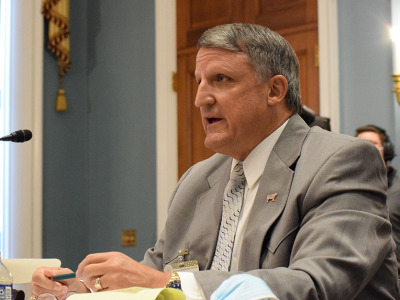Meat industry stakeholders as well as the governments of Canada and Mexico warned USDA’s proposed “Product of USA” label for meat could have discriminatory market impacts and again put the U.S. at risk of a trade war.
The comment period closed June 11 for USDA’s proposal to clarify a “Product of USA” label, which would now require meat bearing the label claim to come from an animal born, raised, slaughtered and processed in the U.S. The proposal came after calls to reform the label and concerns it was being applied to foreign-born product processed in American facilities.
When the proposal was first proposed in March, Ag Secretary Tom Vilsack said he believed the verbiage would properly thread the needle on improving consumer understanding of what is labeled as well as avoid any trade retaliation.
But many commenters disagreed and said the rule is still reminiscent of the mandatory country-of-origin labeling rule the World Trade Organization determined was discriminatory and could create a litany of new challenges as the countries face rising food inflation and labor concerns.
The National Pork Producers Council's board of directors had an extensive discussion on how to comment, but in the end, NPPC President Scott Hays told Agri-Pulse the benefits for some producers with marketing advantages didn’t offset the potential risks for the industry.
“We’ve had issues in the past with these types of labels with trading partners. We don’t need to go through another WTO case on country-of-origin labeling. If the consumer wants a U.S. product, they can find a U.S. product. We don’t feel like it’s worth the risk of our foreign markets for USDA to be dabbling in this area again,” Hays said.
According to NPPC, American meatpackers purchased an additional 800,000 Canadian pigs for processing in U.S. plants in 2020. This is in addition to the 4.4 million weaner/feeder pigs purchased from Canada at approximately 8 weeks old and fed until marketed in the United States.
 NPPC President Scott Hays
NPPC President Scott Hays“NPPC fails to see a distinction between the 2009 (original) or 2013 (amended) MCOOL rule and the proposed rule, which, while billed as voluntary, will have the effect of being mandatory since it will create a strong incentive for producers to prefer domestic animals to imported ones so they can use the ‘Product of USA’ and ‘Made in the USA’ claims,” NPPC wrote in its comments.
“The added costs of segregating animals and maintaining records to demonstrate compliance with the rule would do little, if anything, to address consumer confusion about the origin of products. Indeed, the one certain outcome for consumers would be increased prices to feed their families,” NPPC said.
The National Cattlemen’s Beef Association also commented that the verifications required for use of the voluntary origin label listed in the proposed rule may lead to the segregation of cattle on place of birth or time raised abroad. In recent years, Eastern Seaboard producers have sent 400,000 of their cattle to Canada, and then sent back to the U.S. for processing. The Mexican government said the proposed rule could have an immediate effect on the export of the 900,000 cattle annually exported to the United States.
In 2021, NCBA asked the Food Safety Inspection Service to eliminate the label. Instead, they wanted to replace it with one that can be verified and that producers could use to voluntarily market their products with USDA-verified claims of origin.
“The current generic POTUSA label is broken, and cattle producers need a voluntary and verifiable tool that allows us to differentiate our beef in the marketplace,” NCBA President Todd Wilkinson said in a statement to Agri-Pulse. “NCBA supports voluntary marketing tools that indicate beef products derived from cattle that are born, raised and harvested in the United States, but any origin marketing claim must be verifiable and offer true added value to American cattle producers.”
 NCBA President Todd Wilkinson
NCBA President Todd WilkinsonNCBA’s comments detailed concerns with the possibility that compliance requires full traceability back to the farm and whether outside parties would have access to that information.
NCBA also noted that state and regional origin claims have increased in recent years to capture the growing demand for local beef, however, the “proposed rule says that generic labels with state and regional claims must meet the same compliance standards as the revised generic ‘Product of USA’ label.”
NCBA said USDA would even need to issue a separate rulemaking to address this issue if the rule is enacted. The North American Meat Institute also asked for the agency’s position on state and local claims.
The Canadian Meat Council, which represents meatpackers and processors and those who service the meat industry, commented that segregation could “double the space required and vastly increase the time and resources for companies who need to comply.” The change would come, CMC added “at a time when both countries are experiencing critical and chronic labor challenges.”
The governments of Mexico and Canada both filed comments which also detailed the importance of the integrated supply chains to the North American meat supply, as well as trade concerns.
Mexico’s comments stated the proposed rule could pose technical barriers that are barred under the U.S.-Mexico-Canada Agreement. “Even if a measure does not legally require a certain treatment of imports, it may create incentives for market players to behave in a certain way and thus have a ‘practical effect’ of treating imported products less favorably,” Mexico’s comments said.
Canada’s comments noted the U.S. is a large importer of trimmings from Canada to make sausages, burgers, patties or ground meat products. Canada warned that many small and medium-sized businesses cannot afford to only source American products, which would result in diverting more of U.S. ranchers’ cuts of meat to meet trimmings demand, potentially increasing costs to retailers and consumers.
“Canada respectfully requests that USDA-FSIS pauses and reconsiders the proposed rule in order to allow for consultations between Canadian and U.S. officials to ensure fulsome technical exchange on this issue, and its implications,” Canada’s comments said.
Although beef and pork were found not compliant under trade rules for MCOOL, the law still applies to the U.S. chicken industry. Since the vast majority of chicken and chicken products come from chickens hatched, raised and harvested in the United States, the National Chicken Council's comments said the group “does not necessarily agree a change in FSIS’s policy is necessary, although NCC supports clearly allowing labels to call attention to the U.S. origin of the chicken component used in that product.”
Don’t miss a beat! It’s easy to sign up for a FREE month of Agri-Pulse news! For the latest on what’s happening in Washington, D.C. and around the country in agriculture, just click here.
But the turkey industry faces another challenge. Canada’s comments noted that a significant volume of day-old poults are traded between the U.S. and Canada each year. Canada has a higher volume of the female hens, whereas the U.S. prefers the male poults, or toms.
“Given that sex of the poults is generally only identified once the poults have hatched, there is significant movement of day-old poults in both directions across the border. In such cases, these day-old poults are not ‘born’ in the country of end destination,” the comments said. “Accordingly, the proposed rule, which emphasizes ‘born in the U.S.’ has the potential to disrupt the market stabilization effects of this bilateral trade.”
According to the Canadian government, Canada exported 7.5 million turkey poults to the U.S. in 2022 and imported 5.8 million turkey poults from the United States.
The North American Meat Institute asked for several clarifications in its comments and also asked for ample time to implement a rule should USDA proceed forward.
NAMI asked USDA to consider another alternative to “Product of USA” for those that may have been processed in the U.S., such as “Processed in the USA” and for the department to reevaluate its cost-benefit analysis. USDA’s rule estimated relabeling, recordkeeping and marketing testing costs combined to cost $3 billion over 10 years.
But several U.S. industry groups are supportive of the changes.
In comments to FSIS, the National Farmers Union, a longtime supporter of COOL, backed the proposed rule.
“The rulemaking process for this issue has faced many delays and it is long past due for FSIS to finalize implementation of this rule,” NFU said in its comments.
If a processor is unable to identify whether a product is born, raised, slaughtered and processed in the United States, it could voluntarily choose not to label the product as “Product of USA,” NFU said. “Unlike mandatory COOL, the proposed rule imposes no recordkeeping or 'product segregation' requirements on any company that does not wish to include a U.S. origin claim. For companies that do wish to make these claims, however, meaningful standards must apply,” NFU's comments stated.
The U.S. Cattlemen's Association also filed comments in support of the proposed rule as it “finally closes the 'Product of the USA' loophole by accurately defining what these voluntary origin claims mean, something that the organization has been working to clarify since the repeal of mandatory country-of-origin labeling in 2015,” wrote Justin Tupper, USCA president in comments to USDA.
“If it says, ‘Made in the USA,’ then it should be from cattle that have only known USA soil,” he said.
For more news, visit www.Agri-Pulse.com.


